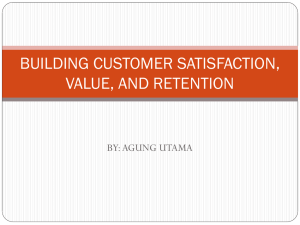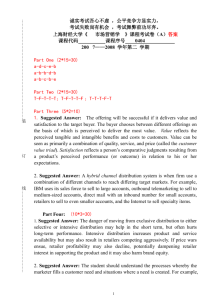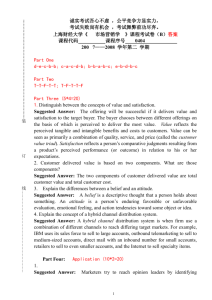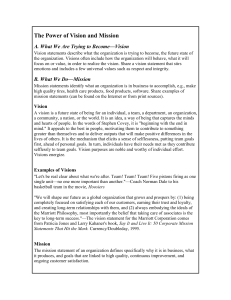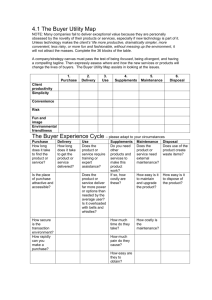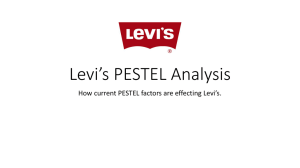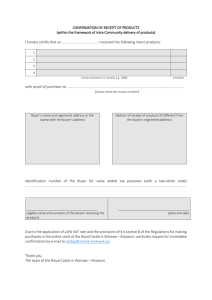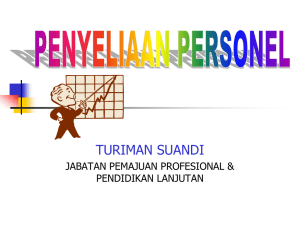BUILDING CUSTOMER SATISFACTION, VALUE, AND RETENTION
advertisement
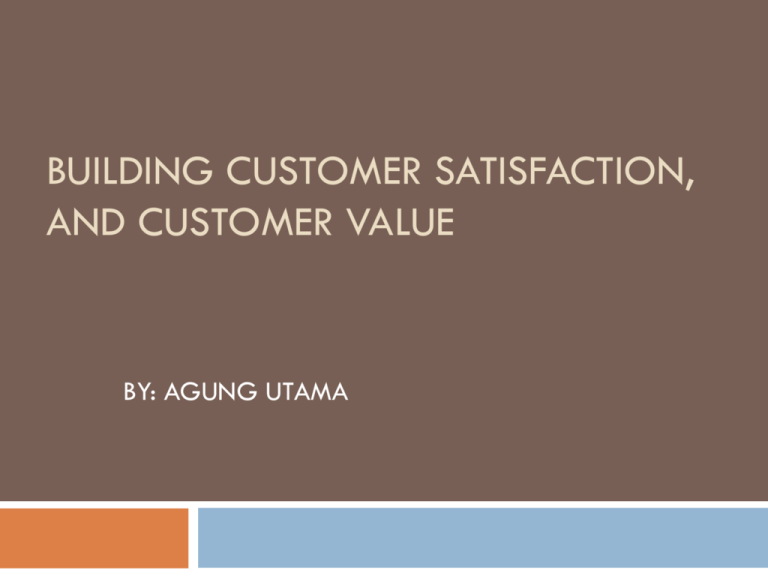
BUILDING CUSTOMER SATISFACTION, AND CUSTOMER VALUE BY: AGUNG UTAMA Total Customer Satisfaction The customer satisfaction is depend on the offer’s performance in relation to the customer’s expectation. Satisfaction : a person’s feelings of pleasure or dissappoinment resulting from comparing a product’s perceived performance (outcome) in relation to his or her expectations. If P < E If P = E If P > E Satisfied/Delighted P=Performance E=Expectation Dissatisfied Satisfied Highly Customer Expectations How do customer form their expectations? From past buying experience, friend’s and associates’s advice, and marketer’s and competitior’s information and promises If marketers raise expectations too high, the buyer is likely to be dissappointed If marketers set expectations too low, the buyer won’t attract the company’s offering. The important key to generating high customer loyalty is delivering high customer value. A company must design a competitively superior value proposition aimed at a specific market segment (Michael Lanning). The value proposition : consist of whole cluster of benefits the company promises to deliver ; it is more than the core positioning of the offering. In a hypercompetitive economy a company can only win the competition by creating and delivering superior values. This involves 5 capabilities : 1. Understanding customer value 2. Creating customer value 3. Delivering customer value 4. Capturing customer value 5. Sustaining customer value To succeed, a company needs to use the concepts of a value chain and a value delivery network. Defining Customer Value Customer perceived value (CPV) : The difference between the prospective customer‘s evaluation of all benefits and all the cost of an offering and the perceived alternatives. Customer perceived value (CPV) = Total Customer Value ( TCV)-Total Customer Cost (TCC) Total Customer Value : the perceived monetary value of the bundle of economic, functional and psychological benefits customer expect from a given market offering. Total Customer Cost : the bundle of costs customers expect to incur in evaluating, obtaining, using and disposing of the given market offering. Determinants of Customer Value Customer Delivered value Total Customer value Total Customer Cost Product Value Monetary Cost Service Value Time Cost Personel Value Energy Cost Image Value Psychic Cost Does the customer will always buy the product which delivering the greater customer value? Not Necessarily. Why? Because the customer also examines his total cost of transacting with the product and the alternative, which consists of more than the money before making the buying decision. Based on this decision making theory, there are three (3) ways to making success in selling to the buyer : 1. 2. 3. Increasing total customer value by improving product, services, personel, and/or image benefits. Reducing the buyer’s non monetary cost by reducing the time, energy, and psychic cost. Reducing it’s product monetary cost to the buyer. The use of value delivery network for creating superior customer value Many companies today have partnered with specific suppliers and distributors to create a superior value delivery network (supply chain) For example: Levi Strauss & Company and connections with its suppliers and distributors. One of levi’s major retailers is Sears. Every nights levi’s learns the sizes and styles of its blue jeans sold through Sears and other major outlets. Levi’s then electronically orders more fabric for next day delivery from Miliken andCompany, its fabric suplier. Miliken, in turn , relays an order for more fiber to Dupont, its fibre supplier. In this way, the partners in the supply chain use the most current sales information to manufacture what is selling, rather than for a forecast that may not match current demand. In this system, the goods are pulled by demand rather than pushed by supply. Competition is Between networks, not Companies. the winner is the company with the better network DuPont (Fibers) Miliken (Fabric) Levi’s (Apparel) Sears (Retail) Customer
